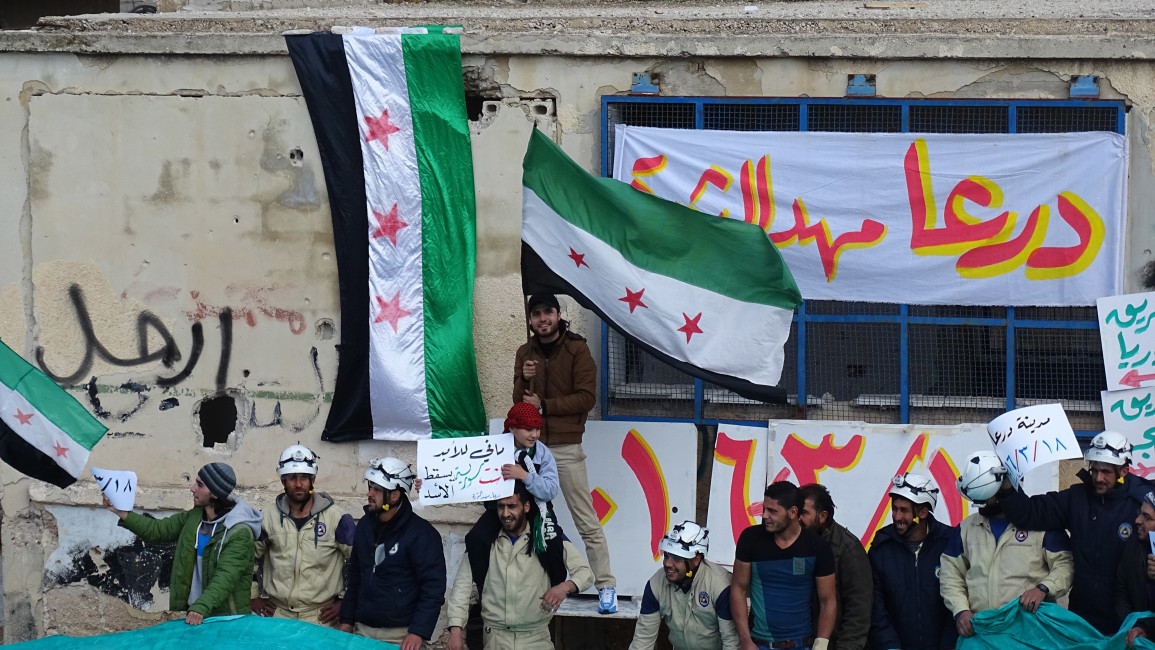Dissent spreads to Syria's Latakia as protests intensify in the south
Syrians living in Latakia, a coastal city thought to be generally supportive of the Assad regime, took to social media to express their discontent with its policies this week as rare protests intensified in the country's southern provinces.
Ayman Fares, a resident of the town of Banias just south of Latakia, posted a video on Saturday complaining about poor living conditions and daring President al-Assad to arrest him.
"Bashar al-Assad … if you are a man, come. Come yourself, don't send your dogs … No one but you and your wife have made the [Syrian] people poor. I know your money is outside of the country," al-Fares said in a Facebook video on 19 August.
The coastal city of Latakia is home to the same Alawite religious minority to which Syrian President Bashar al-Assad belongs and generally did not experience the same protests which rocked the rest of the country during the 2011 uprising.
However, expressions of discontent have appeared even in regime-dominated areas such as Latakia as economic conditions steadily worsen in the country. Around 90 per cent of Syrians live in poverty, and over 60 per cent of those living in regime-held areas are considered food insecure by the UN.
Last week, the Syrian lira dropped to an all-time low of 15,000 to the US dollar, compared to the pre-war value of 47 liras to the dollar. The precipitous drop in purchasing power accompanied slashing of state subsidies, sparking protests in the southern provinces of Daraa and Suweida.
Another resident of Latakia, Ahmad Ibrahim Ismail, an agricultural worker, was arrested by security services for a Facebook post which criticised the rising cost of living.
A source familiar with the case told The New Arab that there was no reason given for Ismail's arrest, only that he committed an "electronic crime which harmed the state."
His arrest has sparked a show of solidarity across social media under the hashtag "We are all Ahmad Ismail."
"Ahmad is poor and unsupported by anything or any political party. He was just talking about his pain and the pain of others. People support him because he is honest," the source said.
According to Syrian media outlet Enab Baladi, there has been a wave of arrests in Latakia since 20 August as security services fear that the unrest which has seized the country's south could spread even further.
A decentralised protest movement has also appeared in regime-held territory, called the "10 August Movement."
The movement calls for an end to "the humiliation, armed [conflict], blood, extremism, and to division" within Syria.
The leaderless movement has seen mostly young protesters posting pictures of protest slogans deep within regime territory, such as in front of governmental buildings in the capital city of Damascus.
Open protests and a violent response
While simmering discontent began to bubble over on social media on Syria's coast, the country's south has been gripped with continual protests since last Thursday.
Protesters in Daraa and Suweida have occupied public spaces, chanting slogans calling for the fall of the regime and waving the Syrian revolutionary flag.
The protests in the south started as a general strike in response to the lira's downward spiral but have since spread to include political demands.
On Tuesday, 22 August, protesters in eastern Suweida stormed the local Baath party's office and removed all signage linked to the party, which rules the country.
"The protests make you feel that you are in 2011 again at the beginning of the revolution. There is no fear, no hesitation. Rather, the demonstrators chanted with anger and violence," Maan Khadaj, an activist participating in the protests, told TNA from Suweida.
Khadaj said that despite the lack of fear, he knew that regime security services "are moving" and that he was expecting a response soon.
On Monday night, the regime and local opposition forces exchanged fire after the former shot at protesters.
Military forces then shelled the city with mortar shells, which reportedly resulted in no injuries.
Protests in Daraa in the summer of 2021 led to a confrontation between protesters and opposition fighters on one side and the regime on the other.
The regime violently quelled protests and imposed stricter control on the restive southern province, launching a new "settlement process" to control former opposition fighters.
Security forces have thus far not interfered in protests in Suweida, and state media has not commented on the situation.



